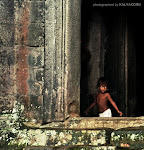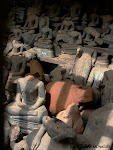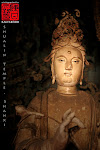Over the past few decades, the world has changed dramatically due to the advance development of technology. This technological revolution is having a major impact world-wide. “It has increased competition within and between countries and has placed a high value on intellectual capital” (QCA, 2000). People of new generation must be able to keep in pace with the world that is moving rapidly towards a “hyper-individualized era” (Frey, 2007), where people value more of originality and individuality while pay less interests in products similar to those already existed. Hence:
“One of the defining features of contemporary life, and increasingly of the future, is the accelerated pace of change. The world never stands still. Its swift changeability has turned into a constituent feature of global historical development. Even in private life, change tends to oust continuity and stability. We have entered a transitional period marked not just by the calendar watershed but by a historical divide beyond which there lies a lot of uncertainty” (Kinelev, 1998)
As the change is occurring, all educators are confronted with “how to prepare youngsters so that they can survive and thrive in a world different from one ever known or even imagined before” (Gardner, 2006, p. 17.
 With this being said, I personally believe that to educate is to provide the foundation for child’s personal growth as an individual in association with reality. To survive in the world that changes rapidly, one must be different and unique. He must have the ability to bring out the best of himself (individuality) and take it to the next level with creativity, but not to forget the truth of reality. Educators must help by facilitating children to develop these abilities at the cognitive level. Children must be educated with knowledge that doesn’t apply only in classrooms, but that is something they can relate to continually throughout life. Only in this case we can call education successful.
With this being said, I personally believe that to educate is to provide the foundation for child’s personal growth as an individual in association with reality. To survive in the world that changes rapidly, one must be different and unique. He must have the ability to bring out the best of himself (individuality) and take it to the next level with creativity, but not to forget the truth of reality. Educators must help by facilitating children to develop these abilities at the cognitive level. Children must be educated with knowledge that doesn’t apply only in classrooms, but that is something they can relate to continually throughout life. Only in this case we can call education successful.KNOWLEDGE FOR LIFE
To prepare children for the changing world with diverse information, education should not provide students with only what they should learn now, but must equip them with foundation for one’s life as a whole, where learning can continue throughout life in a self-directed manner. “The central task of education is to implant a will and facility for learning; it should produce not learned but learning people,” Ayn Rand. Educators must facilitate the learners to develop their motivation in learning as well as their cognitive abilities to process the learning.
Through education, children should develop their understandings of why education is important and how can it relates to them now and in the future. These understandings are developed when the understanding of self is developed, or in Maslow’s terms, when self-actualization is developed. This is because, only then, one knows what he wants in life and is driven inwardly to seek for knowledge for he can succeed that goal. Thus, educators must as well prepare children with ability to process the knowledge by themselves. They must be taught to “know-why” and “know-how” (Morris, 2006) by knowing the ways to connect to information, to access that information, to evaluate and analyze, to think critically, and to find answers on their own.
INDIVIDUALITY
Though everything seems to change as the result of advancement in technology, one thing that has always been the same throughout time is how the society is diverse. Society is made up of different characters of human beings. Each human being is unique and original as for one behaves based on the image of self, out of intentionality and values (Kurtz, 2000). This is because human is an autonomous being (Huitt, 2001). Human is independent and has the ability to take responsibility of his own education (Porter, 2007). Educators, therefore, must help the learners to understand this fact and facilitate them for they are able to develop the personal growth as an individual.
How a person develops an individual growth associates with two factors. One is the child’s “innate capacity for growth as they strive to become all they can be” (Porter, 2007). Another is one’s experience from the outside in reflection from the inside. A child’s character has been determined since he was born, but starts to develop as he responds to environment experienced throughout life. It is purely within the abstract of the mind in reactions with the environment, as one gains perception towards each particular situation he goes through.
As for child’s uniqueness and individuality, educators need to understand and accept the fact that their students are different from one another. One method may suit a group of students while another may need a totally different approach. Moreover, since human is an independent autonomous being, students have the right to choose and would only choose to learn what they want to learn. Educators cannot force students, but must create motivations with a curriculum that would interest students and engage them to the lesson. Students then voluntarily involve in the class and are able to learn the concepts given to them. Teachers must keep in mind to be open and flexible.
REALITY
As mentioned in the previous section, an individual growth developed from innate (mind and perception) of a person in association with one’s reaction and response to the outer experience. Yet, “if one’s views are biased, one’s development won’t go in the right direction” (Liem, 2005). Thus, another important element should be emphasized in education is the understanding of reality. In reverse, reality itself is “the interaction of an individual with environment or experience” (Ornstein & Levine, 2006), which comprised of dependently originated phenomena (Wikipedia, 2009). People learn by reflecting these associations between themselves and the reality. To guide students towards good direction is, then, to “broader their perspectives, in a circumspect way – sincerely and correctly” (Liem, 2005).
In addition, humans are socialized animals that always interact with one another. The fact is humans are autonomous beings, who are living together within society, on a planet that spins on its own. Moreover, although humans are independent, the existence of lives and all things are dependent (Buddhist Philosophy, 2009). There is always a cause and consequence. Therefore, only the understanding of self is not enough. One needs to comprehend the reality of the world while learn to love oneself and embrace who he is as an individual as he respects others who are as well different and individual.
CREATIVITY
Creativity can be defined as the ability to create new and meaningful things with originality. It is a product of idea, action, or object that is new and valued, in which depends on the cultural context (Csikszentmihalyi, 1996). Creative people are simply the ones who are able put ideas into a new perspective. In the past few decades, the importance of this ability has been widely discussed among the educational and psychological community (Wissink, 2001). This is probably because the advancement of technology has brought the crowd to realize that the world always moves forward. People of this changing world expect to always see something new and different. New generations are required to be more creative than ever that they must be free from chains of old thoughts and classic aesthetics. Nonetheless, this should not be a difficult task since every human is already different and unique. Hence:
“Creativity is possible in all areas of human activity, including the arts, sciences, at work at play and in all other areas of daily life. All people have creative abilities and we all have them differently. When individuals find their creative strengths, it can have an enormous impact on self-esteem and on overall achievement” (NACCCE, 2000).
Thus, education should play an important role in encouraging creativity which young people already have. New thoughts, ideas and options must strongly be exposed to students. Curriculum should allow students to explore. Students should be challenged to step out of the box and be different, but still stay true to who they are. “Serious creative achievement relies on knowledge, control of materials and command of ideas. Creative education involves a balance between teaching knowledge and skills, and encouraging innovation.” (NACCE, 2000).
..............................................................
By Kalyakorn Naksompop
Written in August, 2009 as a part of the report "Personal Philosophy"


.jpg)

.jpg)
.jpg)



No comments:
Post a Comment